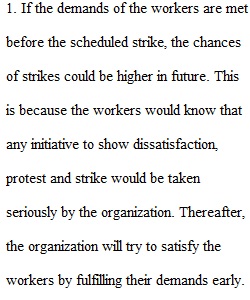


Q Case Discussion 5: Philadelphia Airport Workers On July 12, 2016, Philadelphia airport workers voted (461 to 5) to strike by walking off the job during the Democratic National Convention (DNC), July 25-28. The DNC was expected to attract 50,000 attendees. The airport workers hold positions like baggage handlers, wheelchair attendants, and airplane cleaners, who are subcontracted by the PHL airport. The next day, expressing his support for the workers’ right to unionize and to be paid a living wage, Philadelphia Mayor Jim Kenney said “There is no question that these workers deserve a living wage, paid leave and the right to form a union without interference from their employer.” The mayor also said, “While we don’t anticipate these demonstrators will interfere with Airport service during the DNC, that fact does not make these working conditions any less of an issue … Supporting these workers is not just the right thing to do for the DNC, it’s the right thing to do. We urge the subcontractors to step up for its employees.” The mid-Atlantic chapter of SEIU 32BJ, a union of property service workers, has tried to unionize airport workers around workers’ interests in more efficient scheduling, disciplinary and sick pay systems. The union’s area vice president, Gabe Morgan, stated that workers received wage increases up to $12 after past protests. The Pennsylvania state minimum wage at the time of the July 2016 vote matched the federal minimum wage of $7.25 per hour. 1. Suppose that the workers’ demands are met the night before the scheduled strike, so that the strike is averted. Among other benefits, this means that the workers receive a significant wage increase, with the lowest-paid worker receiving considerably more than the legislated hourly minimum wage of $7.25. Describe the predicted effects on compensation and employment. 2. Suppose the strike happens. The longer it drags on, which side (the workers or the management) is more likely to win? Is the concept of “winning” even meaningful in the context of a strike, which imposes big costs on both sides? 3. Also in 2016, the California Faculty Association (CFA) voted to strike to raise professors’ salaries in the CSU system. The strike was averted in Spring 2016 due to wage concessions by the Chancellor’s Office, granting total raises of 10.5% (spread out in 3 smaller installments over the next 18 months) to professors in the CSU system. In which setting (the PHL Airport workers, or the CSU professors) is the threat of a strike more likely to induce wage concessions, and why? 4. In addition to wages, the airport workers care about more efficient scheduling, disciplinary and sick pay systems. Getting everything they want on all of these dimensions is unlikely, so they must choose what to emphasize in their bargaining strategy. What are the considerations that come into play in making this decision, from the workers’ perspectives? 5. Management is unlikely to get its preferred outcome (i.e., no concessions on any of the workers’ demands). What considerations come into play concerning what management chooses to emphasize in its bargaining strategy? Note: This case is based on an article published in BizPhilly on July 13, 2016, entitled “Kenney on Potential Airport Strike: Workers Deserve a Living Wage” by Fabiola Cineas.
View Related Questions